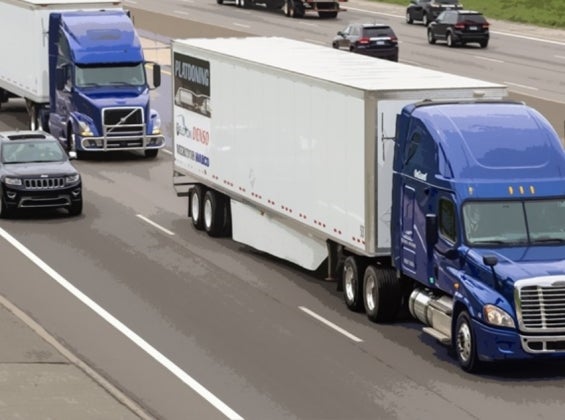Headline News
Putting The Brakes On Platooning: UPS Teamsters Raise Concerns On Connected Vehicle Technology

As the logistics industry remains ever focused on streamlining its operations, the jobs of UPS Teamsters are becoming more impacted by cost-cutting “modernization” schemes.
In recent years, companies have been trying to advance platooning technology, which allows a contained pack of trucks to be digitally connected and driven in formation as a way to reduce wind resistance and increase fuel efficiency. Platoon testing currently includes a driver in each truck; a lead driver in the front does most of the work while drivers in the following two trucks are mainly responsible for steering.
Companies like UPS are clearly interested in this controversial concept. Along with FedEx, they have invested in Peloton, a company that is developing the technology and may roll out a platoon system this year. Meanwhile, industry experts have said platoons are the first step toward fully autonomous trucks.
“While we fully support industry efforts to raise fuel efficiency standards, this new technology raises important public safety concerns and would have a significant impact on the role of UPS Freight drivers,” said Teamsters Package Division Director Sean O’Brien.
Peloton tethers trucks in pairs using vehicle-to-vehicle communications, radar-based braking systems and vehicle control algorithms to create a tightly-spaced convoy of trucks to maximize fuel efficiency. How this technology could impact lead drivers in terms of additional duties and skills is of great interest to the Teamsters, along with questions about driver liability and safety.
Pushing Back at the State Level
State laws are currently the main thing standing in the way of unsafe platooning technology. Specifically, tech companies are trying to get states to change following-too-close laws. Ten states have obliged the industry, approving platoon testing or fleet trials, while another 20 states have expressed interest in platoon testing.
Although test programs have popped up around the country, the good news is that Teamsters are pushing back at the state level.
Missouri banned platoon testing last year after then-Gov. Jay Nixon vetoed a measure that would have established a pilot program and waived the state’s 300-foot following distance requirement for commercial trucks.
“House Bill 1733 fails to require a trained CDL driver to be present in both trucks at all times with both active and passive interaction and control of either one or all trucks in the platoon. In other states and across Europe, this technology has led to so called ‘cooperative driving’ and driverless trucks,” Teamsters General President Jim Hoffa wrote at the time in a letter to Gov. Nixon.
Unfortunately, with the recent election of Gov. Eric Greitens in Missouri, lawmakers were able to push the platooning bill through the legislature and secure the new governor’s signature.
Nevertheless, Teamsters in Missouri lobbied for two amendments that were successfully included in the Missouri bill. One restricts the deployment of platoon testing to certain highways and areas of the state. And, most significant, the second amendment requires a driver in the cab of each truck as a failsafe against technology errors or failure.
The Teamsters UPS Package Division, along with Teamster regulatory and legislative experts, are keeping a close eye on platoon testing to make sure drivers’ jobs – and public safety – are protected.